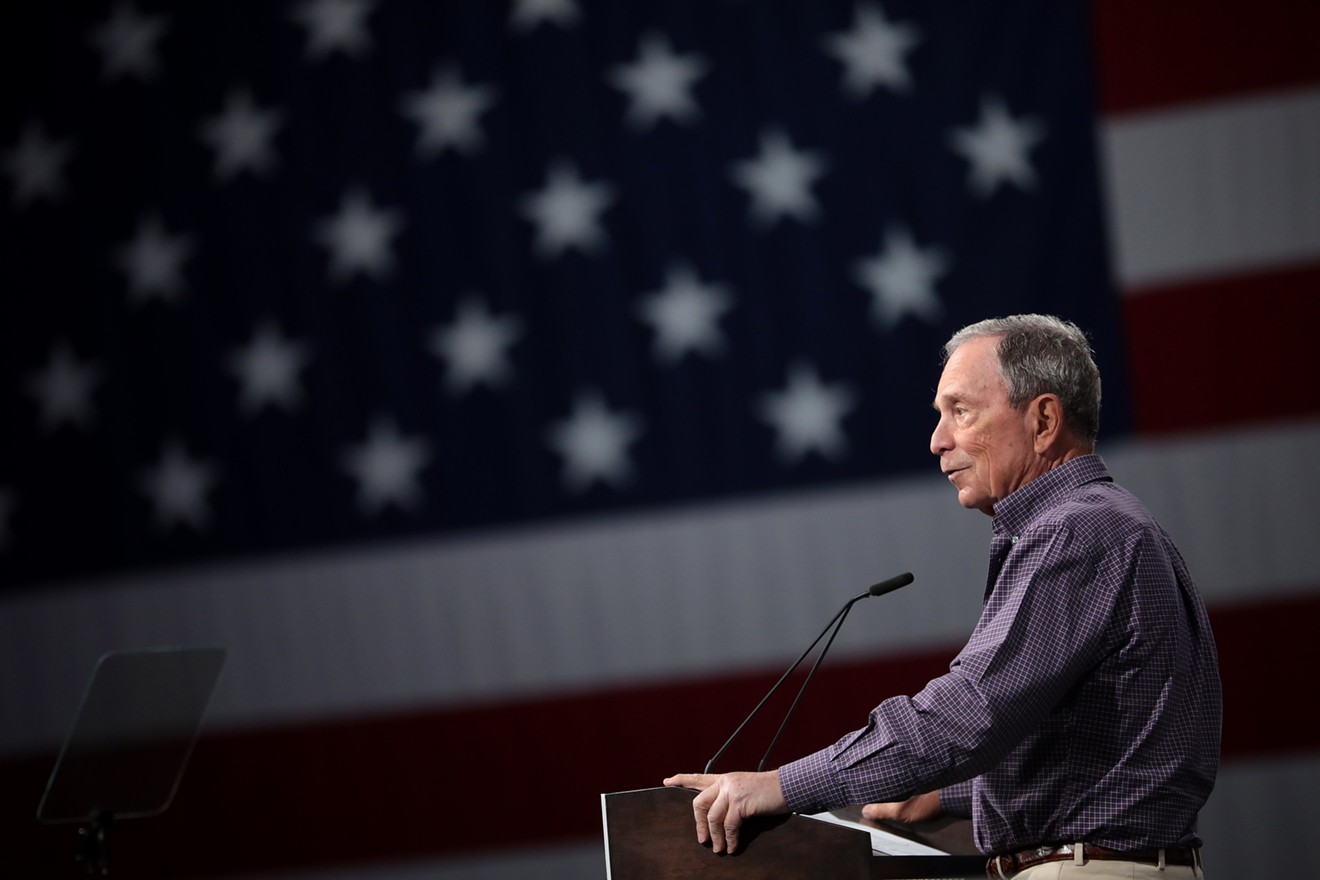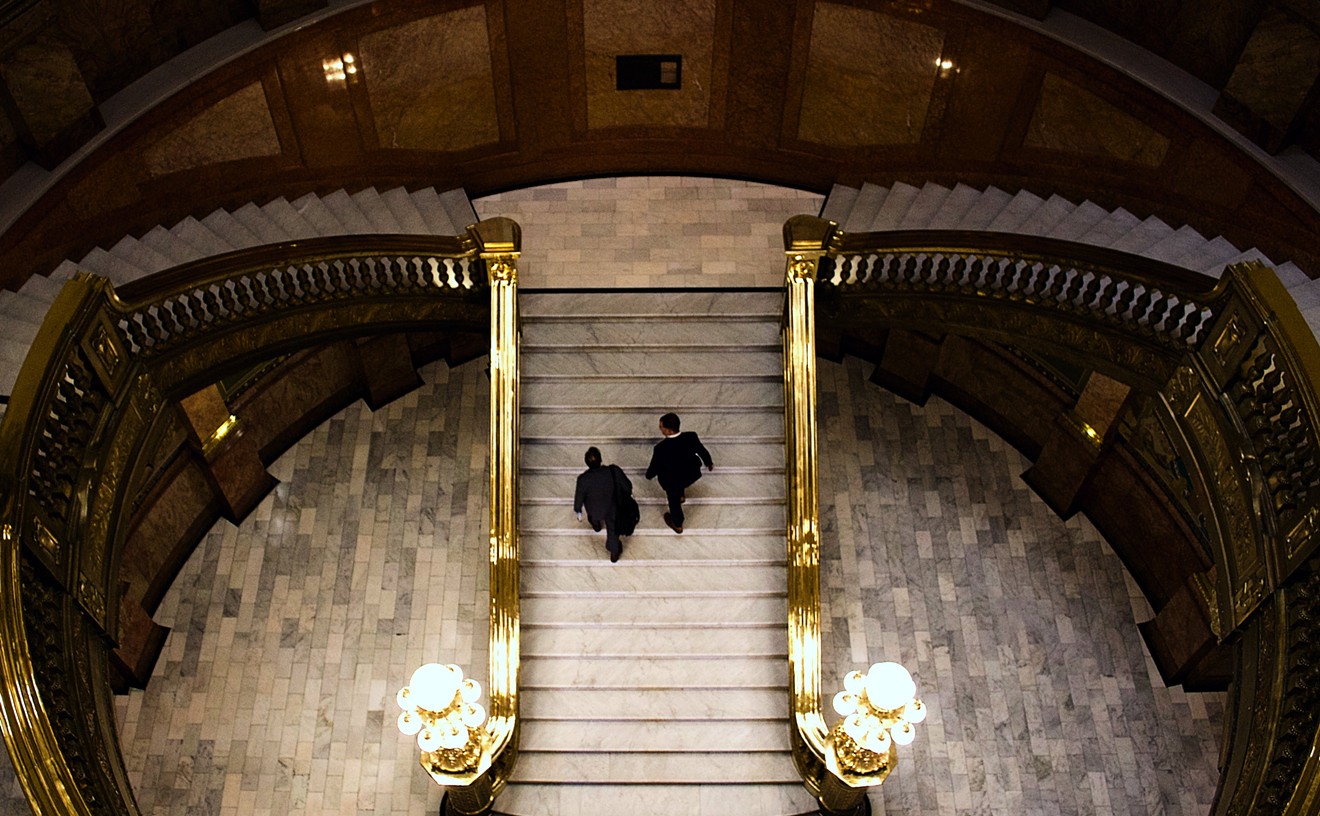John Barton, a former investment banker and self-described progressive, says he’s excited by former New York City mayor and 2020 Democratic presidential hopeful Mike Bloomberg’s plans to deal with climate change, gun violence and other issues facing the country. But when asked about his top policy priority, he doesn’t hesitate.
“First of all, beat Trump,” he says. “Number one, first and foremost, beat Trump.”
At a kickoff event in Denver on Saturday, February 1, Barton and hundreds of other supporters cheered as Bloomberg promised again and again to do exactly that. While his rivals for the Democratic nomination were criss-crossing Iowa ahead of its first-in-the-nation caucus, Bloomberg — the ninth-richest person in the world, according to Forbes — made his second official campaign stop in Colorado, part of an unorthodox strategy to skip traditional early-voting states and spend heavily to make a big splash on “Super Tuesday,” March 3, when Colorado and thirteen other states will hold primaries.
“I’m here in Colorado, not Iowa, for a reason,” Bloomberg told the crowd. “I’m here because Democrats absolutely must win Colorado if we’re going to defeat Donald Trump in November.
“Let’s face it: We cannot afford another four years of this,” he added. “I am running to defeat Donald Trump. We’re going to start putting the ‘United’ back in the United States of America and start getting big things done.”
He spoke, in broad terms, about some of those “big things”: providing health insurance to every American, passing gun-control laws, confronting climate change. But specific programs and policy proposals come second with Bloomberg, who declined to participate in an endorsement interview with the New York Times in December after “explaining that he did not yet have positions on enough issues,” according to a Times spokesperson. What matters, Bloomberg told the crowd in some of the biggest applause lines of his speech, is making sure that there will be “no tweeting from the Oval Office ever again.” What matters is “sending Donald Trump back to Mar-a-Lago permanently.”
There's no doubt that this is a message that resonates with many Coloradans, including the crowd at Saturday’s event, which skewed older, whiter and — if the quality of the Oxford shirts and premium outerwear was any indication — wealthier than the average voter. They sipped Starbucks coffee and lined up for a free lunch buffet as they packed into the campaign’s new state headquarters, a former Patagonia outlet that occupies some of the most sought-after real estate in downtown Denver, a far cry from the drab, remote digs typically leased by political campaigns.
“I’ve been a Republican for thirty years,” says Winfred Deal, a career coach from Aurora who attended Saturday’s rally. “The reason I’m supporting [Bloomberg] is because Trump is a sleazebag and I don’t like him. I didn’t vote for him in 2016, and I won’t do it this year, either. He’s just awful.”
Deal liked what he heard from Bloomberg and says he’s excited to begin reaching out to some of the “over 1,500 C-level executives” he’s worked with over the years and get them on board with the campaign. Like the candidate himself, Deal is not terribly specific about the things he wants the next president to do, but he has faith that Bloomberg will get them done.
“I like how he built businesses and the economy in New York City,” he says. “That place was a cesspool, and he turned it around. He’s that kind of guy. He’s a doer, and he makes things happen.”
For the average American voter, who is used to being inundated with presidential campaign ads every four years but unfamiliar with the ins and outs of political tradecraft, it’s probably not easy to perceive just how unprecedented Bloomberg’s campaign for president really is. From his skip-the-early-states strategy to his entirely self-funded financing and, above all, the staggering sums of money he has been willing to spend in a short period of time, it’s unlike anything ever attempted in modern American politics.
In the five weeks after entering the race on November 24, Bloomberg spent more than $130 million on his campaign, according to Federal Election Commission data. That’s almost twenty times the amount that Hillary Clinton spent during the same stage of her candidacy in 2015. Even with his late start, if Bloomberg accelerates his spending at the same rate that the Clinton campaign did four years ago, he’d be on track to shell out nearly $6 billion trying to elect himself president in 2020 — more than double the total amount spent by the entire field of 2016 presidential candidates combined.
What does all that money buy? The same things that other presidential campaigns are buying, just a lot more of them. Most visibly, Bloomberg has carpet-bombed the airwaves with ads touting his record and slamming Trump, including a sixty-second Super Bowl ad that cost him $11 million. Through February 5, Bloomberg has already spent more on TV advertising than Clinton did during her entire 2016 campaign, and his spending on digital ads also far outpaces the competition. He’s the only candidate so far to spend meaningfully on TV ads in Colorado, dropping an estimated $4.29 million in the Denver and Colorado Springs markets since launching his campaign.
Bloomberg’s fortune has also enabled him to rapidly hire an army of more than 2,000 paid campaign staffers nationwide, including 55 in Colorado alone, according to a campaign spokesperson. The campaign will officially open two more field offices in Aurora and Colorado Springs this weekend, and plans to open at least nine offices across the state before Super Tuesday. Both of those figures are far in excess of what rival campaigns can afford.
Helping draw experienced political operatives to the Bloomberg campaign are generous compensation packages that pay even low-level field organizers $6,000 per month, with many senior staffers making $20,000 per month or more. Staffers receive new iPhone 11s and MacBooks upon joining the campaign and enjoy three catered meals a day, according to a report from the New York Post.
Veterans of past Colorado campaigns, many of whom are reluctant to speak on the record about the Bloomberg juggernaut, describe an aggressive recruitment effort that has sought to lure staffers away from primary rivals and other organizations with jaw-dropping salary offers. For many Democratic operatives, the choice between turning down a truckload of cash or going to work for Bloomberg — a former Republican who spoke passionately in support of President George W. Bush’s re-election at the 2004 Republican National Convention and spent heavily to help elect certain Republican members of Congress as recently as 2016 — isn’t an easy one.
One Democratic strategist, who has experience in Colorado and national politics and is not currently employed by a presidential campaign, says he turned down a high-level position with Bloomberg 2020 because of disagreements with his policies and vision — but not before giving the offer plenty of thought. It’s a dilemma faced by many other staffers who might not share Bloomberg’s politics but are tempted by the offer of a break from the long hours, low pay and precariousness of campaign work they're used to.
“Especially for people who are not accustomed to making that type of money, or for a lot of folks anywhere near it — it changes pretty much everything about your existence, at that point,” says the strategist, who asked to remain anonymous in order to speak openly.
Another local campaign staffer, who declined a more limited role with the campaign, says he knows at least five others who were in a similar position. “All five of them were like, ‘This could be the difference between buying a house or getting out of student debt,’” he says.
In addition to aggressively staffing up his operation, Bloomberg has recruited a variety of experts and activists to "consult" on policy development, which has led to some confusion about whether such work constitutes an endorsement or support for the campaign. A longtime philanthropist, he's leveraged his existing relationships with nonprofits, issue campaigns and other organizations to hold quasi-campaign events like last month's "Roundtable Discussion on Mike’s Climate Policies" in Denver, which featured Bloomberg advisers alongside local environmental advocates and sustainable-business leaders.
Bloomberg, who is not accepting campaign contributions of any amount, has also begun recruiting "committees" of wealthy political donors, asking for their "personal support" rather than their money, according to the New York Times. His "Colorado for Mike Advisory Committee," announced today, February 7, features local heavy hitters like Intertech Plastics founder and onetime gubernatorial candidate Noel Ginsburg and private-equity investor Barry Hirschfield Jr.
Bloomberg's unprecedented political spending spree may only just be beginning. In the wake of the delays and discrepancies that marred the results of the Iowa caucuses, the Times reported that Bloomberg is moving to "exploit the chaotic outcome" by doubling his ad spending. A spokesperson declined to say how much the campaign plans to spend in Colorado ahead of the March 3 primary.
"Mike Bloomberg is laser-focused on beating Donald Trump in November," the campaign said in a statement. "As other Democratic candidates move from Iowa to New Hampshire, Mike continues to build a robust campaign in battleground states that will decide the general election, including Colorado."
Money can buy an endless barrage of TV spots and Facebook ads; it can pay legions of field organizers to knock on doors and communications staffers to spend all day pitching and spinning reporters; it can help strengthen ties with influential civic leaders who can lend a campaign an instant air of authority and credibility. But money, no matter how much of it you have to spend, can't actually buy votes — not yet, at least. Bloomberg, whose net worth is an estimated $61.7 billion, believes he can take a small chunk of that fortune and, through the strange alchemy of American electoral politics, transform it into political power. Will it work?
Local political operatives aren't exactly bullish on Bloomberg's chances of winning Colorado, which voted for Vermont Senator Bernie Sanders by an eighteen-point margin during its 2016 caucuses, but the effectiveness of his operation is already clear. "Do I think hiring some of the best hired guns to do the work is going to work? Yeah," says the campaign staffer, who supports, but isn't employed by, Sanders's 2020 campaign. "We see that buying elections works."
At his Denver office opening, Bloomberg, who reportedly spent months mulling a third-party presidential bid in 2016, reiterated a promise he has made at every opportunity over the last few months: "I want to be clear: My fellow Democrats in this race are all good people," he told the crowd. "If one of them wins the nomination, I've said I will support them, because this election is just too important."
Bloomberg has privately told associates that he could spend as much as $2 billion to ensure that the eventual Democratic nominee beats Trump in November, according to one report, and the opportunity to be part of a well-funded anti-Trump campaign, regardless of who Democrats nominate, has been part of the campaign's pitch to potential hires. That hasn't stopped supporters of progressive candidates like Sanders and Massachusetts Senator Elizabeth Warren from worrying that Bloomberg's presence in the race could increase the likelihood of a brokered Democratic National Convention, among other fears.
Beyond those tactical considerations, political strategists and other observers say they're unsettled by the sheer amount of cash that Bloomberg is pouring into the race, and what it could mean for the future of campaign finance. But for supporters, his free-spending ways aren't just a non-issue — they're a selling point, proof that the Wall Street billionaire and media mogul isn't in the pocket of special interests or other wealthy donors.
"I think it gives him such a tremendous advantage, because he really is beholden to no one," Barton says. He predicts that Bloomberg will win many of the Super Tuesday states, and perhaps even effectively secure the nomination by then. "I really do see a Bloomberg wave coming. I know that seems funny now, but I think you'll see that in the next several weeks."
"Bloomberg's got money," agrees Deal. "You've got to have money. Money is the stuff of life."
[
{
"name": "Air - MediumRectangle - Inline Content - Mobile Display Size",
"component": "12017618",
"insertPoint": "2",
"requiredCountToDisplay": "2"
},{
"name": "Editor Picks",
"component": "17242653",
"insertPoint": "4",
"requiredCountToDisplay": "1"
},{
"name": "Inline Links",
"component": "18838239",
"insertPoint": "8th",
"startingPoint": 8,
"requiredCountToDisplay": "7",
"maxInsertions": 25
},{
"name": "Air - MediumRectangle - Combo - Inline Content",
"component": "17261320",
"insertPoint": "8th",
"startingPoint": 8,
"requiredCountToDisplay": "7",
"maxInsertions": 25
},{
"name": "Inline Links",
"component": "18838239",
"insertPoint": "8th",
"startingPoint": 12,
"requiredCountToDisplay": "11",
"maxInsertions": 25
},{
"name": "Air - Leaderboard Tower - Combo - Inline Content",
"component": "17261321",
"insertPoint": "8th",
"startingPoint": 12,
"requiredCountToDisplay": "11",
"maxInsertions": 25
}
]












